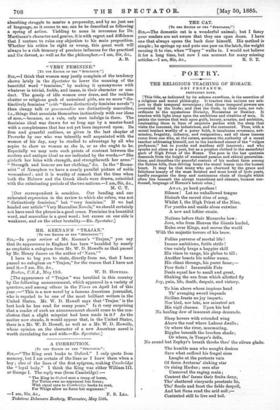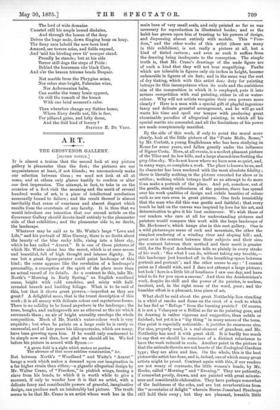. POETRY.
THE RELIGIOUS TEACHING OF HORACE.
ODI PROFANUM. PREFATORY NOTE.
[This Ode, as indicated by its solemn exordium, is the assertion of a religions and moral philosophy. It teaches that nations are subject to their temporal sovereigns ; that those temporal powers are overruled by the Gods; and that the Gods, in their turn, are subordinate to the mysterious Divinity, Necessitas or Destiny. It touches with light irony upon the ambitions and rivalries of men. It paints the terrors that wait upon guilt, luxury, avarice, and ambition, contrasting them in lines of exquisite pathos with the sleep that visits the innocent, the industrious, and the contented. Thus, with a moral instinct worthy of a purer faith, it inculcates reverence, submission, frugality, industry, and resignation ; and all these lessons come from one who, at the outset, assumes the authority of a moral teacher addressing himself, not to the hardened sinner of the " vulgns profanum," but to youths and maidens still innocent ; and who speaks not alone as a poet, but as a prophet clothed in the sacerdotal garb of High Priest of the Muses. The poet in the last quatrain descends from the height of sustained passion and ethical generals' aLions, and describes the peaceful content of his modest farm among the Sabine hills, thus driving home the moral lesson into the human heart. It may be that many who are charmed by the grace and felicitous beauty of the most finished and most loved of lyric poets, hardly recognise the deep and continuous chain of thought which often lies beneath the abrupt transitions and obscure, because condensed, language of Horace's heroic odes.]
AwAY, ye herd profane!
Silence ! Let no unhallowed tongue Disturb the sacred rites of song, Whilst I, the High Priest of the Nine, For youths and maids alone entwine A new and loftier strain.
Nations before their Monarchs bow : Jove, who from Heaven the Giants hurled, Rules over Kings, and moves the world With the majestic terrors of his brow.
Follies perverse of mortal life !
Insane ambitions, futile strife ! One vainly brags a happier skill His vines to range, his glebes to till Another boasts his nobler name, His client throngs, his purer fame; — Poor fools ! Inexorable Fate Deals equal law to small and great,
Shaking the urn from which allotted fly Joy, pain, life, death; despair, and victory.
To him above whose impious head Th.' avenging sword impends Sicilian feasts no joy impart; Nor bird, nor late, nor minstrel art His vigil charms. Upon his bed
No healing dew of innocent sleep descends.
Sleep hovers with extended wing Above the roof where Labour dwells ; Or where the river, murmuring,
Ripples beneath the beechen shade;
Or where, in Tempe's dells, No sound but Zephyr's breath throbs thro' the silvan glade.
The humble man who nought desires Save what sufficed his frugal sires Laughs at the portents vain Of fierce Arcturus' sinking star Or rising Hsedus ; sees afar Unmoved the raging main ;
Content tho' farms their fruits deny, Tho' shattered vineyards prostrate lie, Tho' floods and frost the fields despoil, And hot Suns rend the arid soil ;— Contented still to live and toil.
The lord of wide domains Unsated still his ample bound disdains, And through the bosom of the deep Drives the huge mole, down flinging heap on heap.
The finny race behold the new-born land Amazed, see towers arise, and fields expand, And 'mid his hireling crew th' usurper stand.
Proudly he stands ; but at his side Terror still dogs the steps of Pride : Behind the horseman sits black Care, And o'er the brazen trireme bends Despair.
Not marble from the Phrygian mine, Nor robes star-bright, Falernian wine, Nor Achmmenian balm, Can soothe the weary brain opprest, Or still the tumult of the breast With one brief moment's calm.
Then wherefore change my Sabine home, Where Envy dwells not, life is free, For pillared gates, and lofty dome, And the dull load of luxury ?
STEPHEN E. DE VERE.















































 Previous page
Previous page